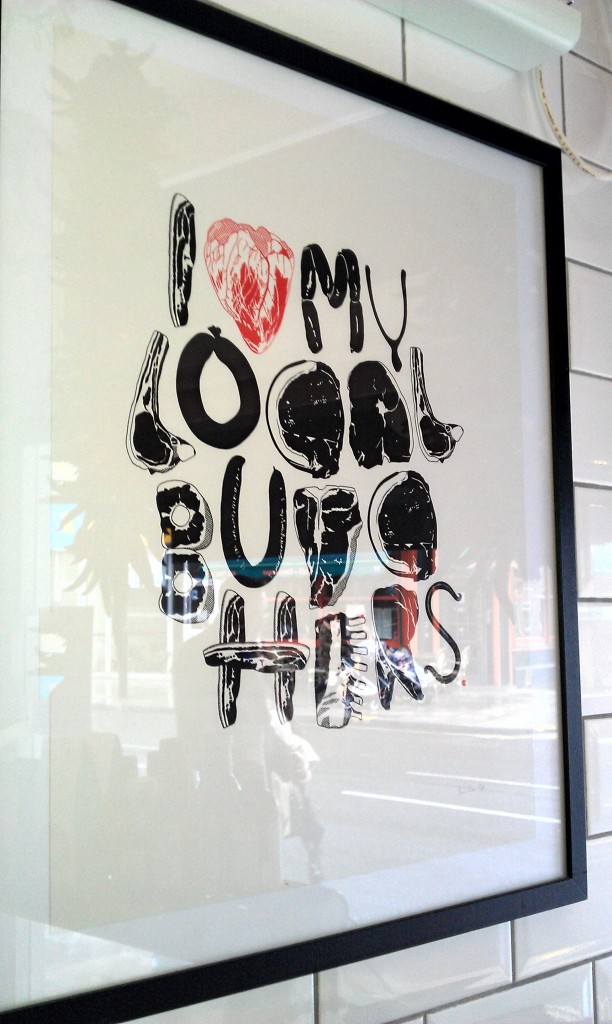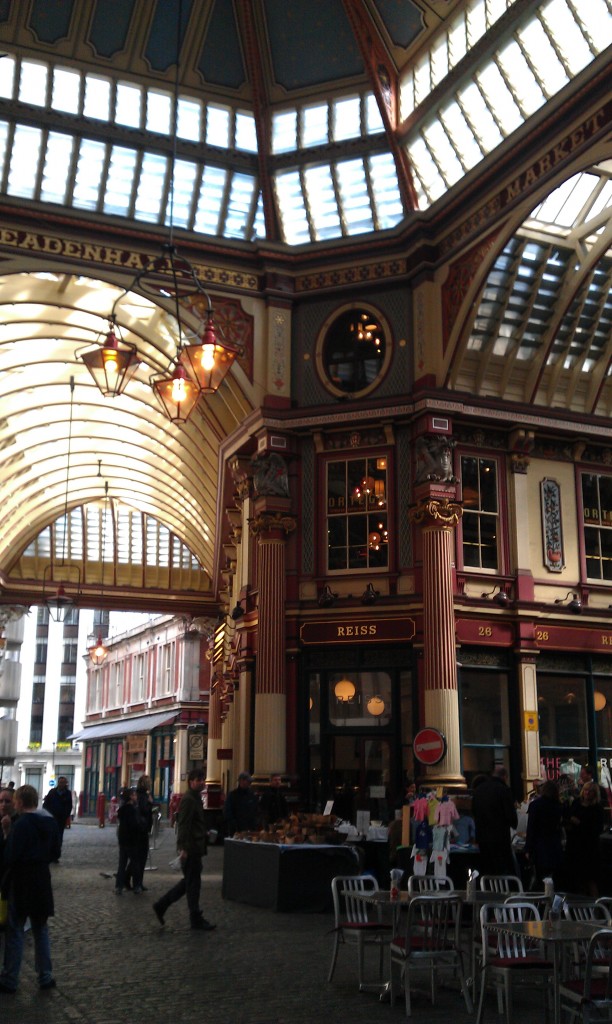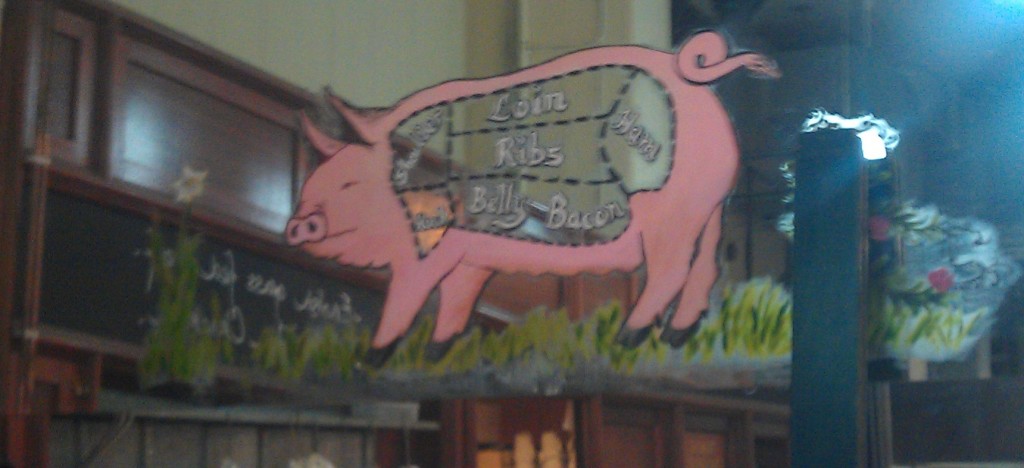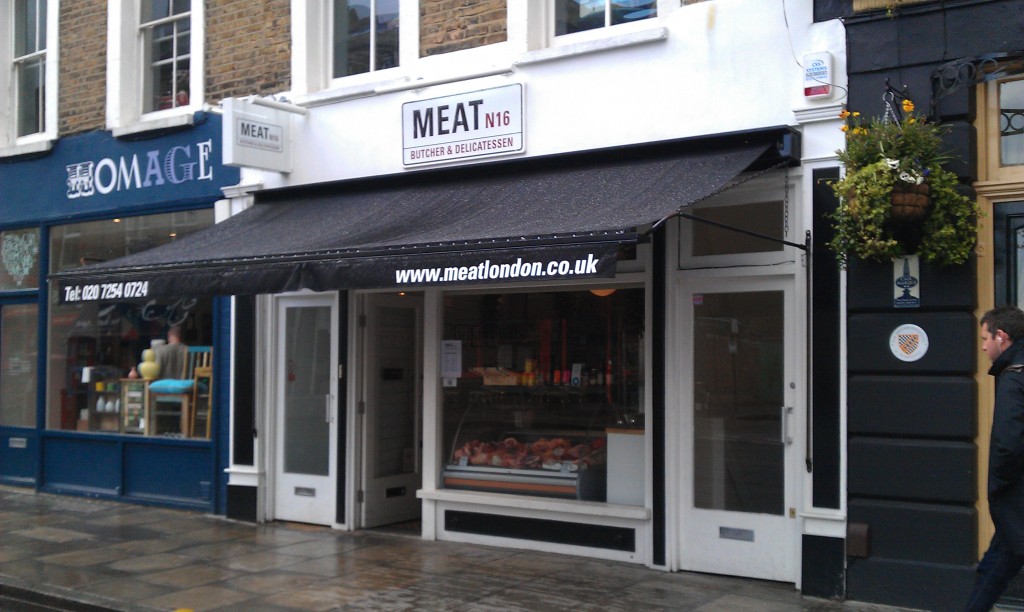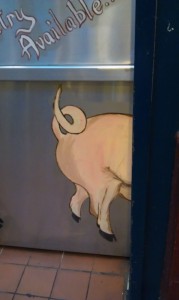In contrast to a previous article, I now raise the subject of meat, namely the craft of Butchery. In keeping with our reflections to the past on this site, the butcher counter used to be highly valued outing and the only place to get your choice fowl or a tender t-bone to gnaw through at the dinner table.
Versus perhaps the more rationed, less considered approach to the purchase of meat in the 80s and 90s, there has been a surge in recent years to source meat of organic and local origin, a thirst which is continually satisfied by various new vendors as well as large supermarkets themselves now looking to market their wares to meet this demand. Films (Food Inc for example) and articles abound with this public obsession with what meat is out there and how it is produced. Butchers are now experiencing something of a renaissance, which I commend! Their expertise and genuine ‘amore’ for their subject is so much more admirable than the ill-looking plastic packed choices available at your more corporate indoor-football-pitch-sized chains. I know which one I would rather exchange coinage for!
I first became privy to this world many years ago when I had a spot working within an architecture firm based near Smithfield’s Market in Farringdon. On various casual lunch breaks, I would potter about the area spying on the latest sausage concoctions and to gaze upon the comings and goings of traders, enticing the public with their prices and discounted end of day chops and ribs.
I also worked at the Butcher & Grill in Wimbledon, a position which inadvertently fell into my lap as I had enlisted my waitress services with another restaurant, however the premise was then bought out by B&G and I decided to stay on (1 of only 2 others that did) and involve myself in this concept restaurant of a Butchers/ Delicatessen/ Restaurant union. This trinity was an absolute pleasure to work within, where you would find me flitting excitedly between the butchers counter (banter in tow) for a freshly cut fillet requested by a table to the Delicatessen staff to enjoy some light conversation, whilst commenting on the latest retail delights ranging from a new condiment to some freshly made salads.
It is through this restaurant that I made my acquaintance with Paul Grout who (now previously) part owned the Butcher and Grill. Since leaving the partnership in 2009 and ever the entrepreneur, he went onto opening the Butcher at Leadenhall, keeping the bankers satisfied with a fresh counter and the next door kitchen cooking up the meat you ordered. In the past 6 months, he has also filled the gap on Stoke Newington’s Church Street with Meat N16.
I have always admired Paul’s zeal and relentless support for any staff he worked with as well as a commitment to the business as a whole, showing up frequently at an ungodly hour to ensure the local clientèle had everything within their grasp once through his welcoming doors. Paul is one of those employers that gives every employee a fair trial; you prove your worth and work hard, then Paul will always look out for you (something I found out first hand on my return from travels abroad and being unemployed).
I met with Paul one Friday afternoon at the Leadenhall Market location, at a very tentative moment! Paul had decided to sell on his business after 2 years and the lucky benefactors taking the reins were previous staff members John and Lilia. As I walked behind the closed butcher shutters, the air was crackling with feelings of nervousness and excitement.
The elaborate interior of Leadenhall Market
They were awaiting a decision from the City of London to give them the go ahead for the new owners. What a privilege to be present on such an occasion! Paul was pacing around on his phone whilst John and Lilia made scribbles for impending plans, all hinging upon the outcome once the call had ended. “Any Catholics out there?” Paul asked as he came off the phone. “What is the difference between white smoke and black smoke?” I speedily proffered an answer and it seems that there was indeed white smoke billowing from the London chimney! And all in time for St. George’s Day! The bankers would get their steak sandwiches once again, with only a forced week of abstinence between Paul closing to the impending re-opening. Reason to celebrate and on a personal note for myself, I was pleased to find out my legacy would also be a continued resident (just look up from the counter and you will gaze upon my painted pig on the mirror).
So with another business chapter closed, Paul and I headed off to Stoke Newington to discuss Meat N16, a butcher shop (and many other things at that) which he opened up with friends and business associates Mark Wise and Richard Jocelyn. After being shown around inside, we eventually sat comfortably at a local public house to begin the exploration of Paul’s odyssey within the meat trade in London.
When asked the question of what he defines as his ‘job’, Paul likes to describe himself as a Retailer. Butcher and Restaurateur are other titles he dabbles with but his beginnings saw him as an Apprentice Chef in ’77.
He worked with Le Gavroche and various other central locations, even contributing to an eatery in the Old Bailey when it earned its first Michelin star. After a few years practicing as chef, Paul also put his hand to bar work and as a waiter. One thing Paul clarifies from this period is that as a chef there is no real education as such of the meat ‘trade’ so it was encouraging when Silvano Giraldin, (previous General Manager of Le Gavroche) supported Paul’s 6 week trip to ‘Boucherie LaMartine’ which is recognised as one of the best butcheries in Paris. This French education in the meat trade was to make a marked impression on Paul and he talks animatedly of his learning there, reminiscing of the experience in a very jovial way. He returned to London and started dealing with buying stock from Smithfield’s with some poultry from France, building contacts on a continual basis with his focussed yet friendly nature.
I ask Paul how the meat trade has varied since the ’70s and ’80s to now. In those times a lot was changing, the Roux Brothers started things off and were the ‘Godfathers’ of the modern day chef. Comparatively to the present day TV chef, there were different standards back then to food. The English didn’t expect ‘boys’ to get into cooking, but with examples like Egon Ronay raising the profile for the restaurant industry it was impossible to ignore a time for change.
In the early 1980’s, butchery was dying. Big companies and chains were thriving and cheaper meat was in demand, almost anything was acceptable (he says with a look of disdain due to the lack of consideration for such purchases). Paul’s approach to the cleaver was Francophile, an approach not entirely understood by UK butchers. There is a certain type of care in the preparation of a piece of meat, the French eat with their eyes and thought is put into the visual experience as well as the cut itself. There is more ‘style’ in French butcheries, more attention to customer service and more efficiency. Meat is trimmed and tied with string to enhance the cooking process. Paul mentions that he is one of very few butchers that will take the wishbone out from the chicken, purely for the sake that this will provide the buyer with more meat and helps it cook more easily. Not a butcher in the UK would do this! Paul’s radical attitude to butchery is refreshing. Here is a man who loves his work and this exuberance is immediately apparent whenever he speaks.
Paul continued to comment on the 1980s and how this was one of the 1st recessions that people were coming out of which had a direct effect on what meat was available. Due to a more restricted budget, people wanted better meat for their money. Celebrity chefs were on the increase with Marco Pierre White and the Roux Brothers doing TV. A revolution was starting. People wanted what they saw on TV. Although they were buying less, they wanted to buy good quality, albeit in smaller quantities.
Paul went onto working for Harvey Nichols in ’92 and had free reign as their Buyer for the Food Market. He had Carte Blanche to buy anything so he always looked to source and provide the best. Food on display was stimulating to both the eye and tongue and there was care and attention to detail everywhere, even down to the knots strung up on the meat (‘Coz it looks better’ he says succinctly). The effect of the TV chef was clearly evident as Paul goes on to describe one example of when Delia Smith used a particular Spanish paprika in a recipe and the next day almost all of London food retailers had sold out!
A 2nd recession and further food scares such as Foot and Mouth and Mad Cow’s really spurred the public interest in ‘where’ their food came from. Paul speaks candidly of his disappointment with British farmers during this period. When the beef ban was imposed, farmers insisted on support but after the ban, prices rose so much so that UK butchers could not keep up. Nowadays, many butchers sell meat with the knowledge of its sustainability and husbandry. “Organic is an issue” Paul states bluntly. There is a misunderstanding by the public (in regards to meat) that because something is organic, it is better. “This is a mistake” he says “There is of course a particular method for organic farming and rules are followed but it does not mean that the meat IS good.” Organic seems to be a certain type of ‘spin’ word, and there is an additional tax to pay in order to be certified. “Organic meat shouldn’t be more expensive” he insists, “but due to this tax, it is. It is when the animal is dead that the real work of what ends up on your dinner plate begins; from hanging the meat, the cut, de-boning and rolling it before it’s sold fresh”.
I raise the question of migration into London, and whether the diversity in cultures has had any particular effect in terms of competition and whether the alternative produce is good. “Obviously there are Caribbean and kosher traders” he says “but these have been around many years. Schools have an increasing mixture of faiths and beliefs, so there has been a kick-back in terms of the meat bought for children’s meals, with kitchens being more inclined to buy mainly Halal produce which does not conflict with the majority in their religious beliefs.”
Paul explains how although he appreciates all cultures have their moral codes; he totally dislikes the methodology in killing the livestock. “You can’t eat an animal that died scared” Paul states. It would have tensed up and he is adamant how he would never sell on such meat. He goes onto mention how one should never mix herds as they tend to fight, and then also, rather endearingly, how cows have a preference for rock music. “I have never needed to be present at the point of kill” Paul says assertively, “I think it’s disgusting with what Jamie Oliver did for example, where he slaughtered an animal live. It’s not necessary. It’s important to understand that the kill was done properly and nicely but not to celebrate it.”
I go on to ask Paul how he summons up the enthusiasm for such subjects and what his motivation is. “I love working with good people!” he says simply. “I love this industry; from the food and wine tasting involved to going to see the animals in the field. Working with fish isn’t quite the same. I leant myself towards being a pastry chef once, I had a good touch for it.” It would seem the meat trade is where his true talent lies.
Paul enjoys all aspects of his work, particularly if a customer comes back after a purchase and enthuses about the delicious chicken they cooked up and how much a success their dinner party was. This could well be the sole reason Paul works so maniacally, ensuring his hard work and drive meets his own high standards; in order to satisfy our stomachs.
Working with suppliers in his field also keeps Paul within his element. He is working with like-minded people, others that get excited about food, wine and produce as much as he does and with a concentrated passion to provide exceptional stock for the benefit of their customers.
Paul’s obsession with the visual translates in the layout of his Meat N16 spot, where he suggested a more alternative way to construct the meat counter. It sits immediately at the front when you walk in, but with the butcher’s blocks more central in an open plan shop, where you can stand next to the butcher as he cuts up your selection. Glass fronted fridges display further carnivorous offerings, all with the guidance and a friendly smile from Michael, Troy or Ryan, the omnipresent butchers. The customer is privy to an enriching retail experience upon entry, not just with meat but with the potential to buy a wonderful carving knife set or a well sourced wine to compliment your shopping. A garden at the back will eventually lend itself as not only a place for brunch but as an outdoor grill so that following your butchery course in the basement you can personally go out and cook up the off cuts of your learning. Paul has always sought to not just sell but educate the buyer. He wants you to see the journey, from field to fridge and he wants you to be inspired. Isn’t that always what all aspects of life should be though? To seek and gain knowledge in order to continually increase your own understanding; to then eventually share your wisdom and ensure such passions continue.
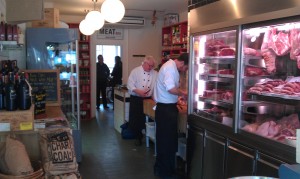
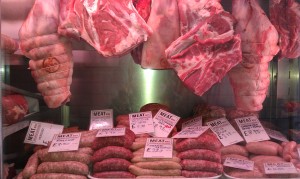 I ask Paul what his favourite cut of beef is. “Rib-eye”! He says enthusiastically. “There is something about the gelatinous fat that runs through that is just SO delicious. You could have a TV dinner and sit and stuff your face with something bad for your diet, but this is where people go wrong. You can eat good things; a nice piece of medium cooked steak with some salad and wine, combined with a bit of exercise is much better for you. Nowadays people are more aware of the animal’s husbandry and source. I recommend hanging the meat for no more that 20-24 days (30-40 is too long).”
I ask Paul what his favourite cut of beef is. “Rib-eye”! He says enthusiastically. “There is something about the gelatinous fat that runs through that is just SO delicious. You could have a TV dinner and sit and stuff your face with something bad for your diet, but this is where people go wrong. You can eat good things; a nice piece of medium cooked steak with some salad and wine, combined with a bit of exercise is much better for you. Nowadays people are more aware of the animal’s husbandry and source. I recommend hanging the meat for no more that 20-24 days (30-40 is too long).”
Paul’s mind continues to churn as he speaks. His eyes are static with energy as he ponders the forthcoming functions he will cater for and further ideas for his businesses. So what new ventures are on the horizon? Paul bats away the subject politely but with a whisper of another site to come. Having conquered the South, East and North of London, me thinks it is the West that is next to be won.
(443)

